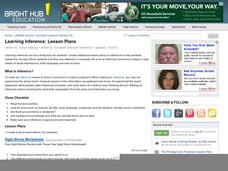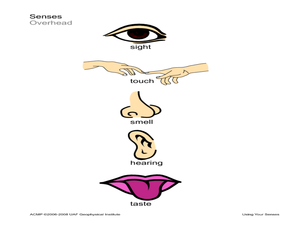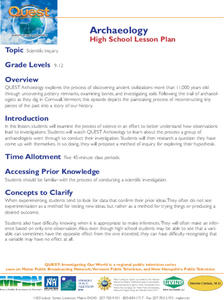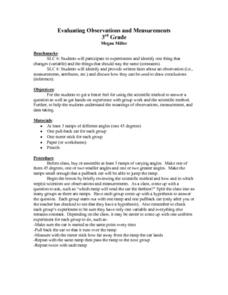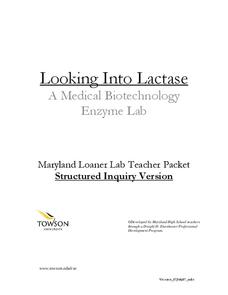Curated OER
What Can We Learn From the Past?
What would future archeologists learn from your scholars' personal belongings? Have them bring in a box of "primary sources" from their home. Discuss the difference between observations and inference, using some of your own items to...
Curated OER
Memories to Last: Observing Monuments
Students use scientific observation and inference to examine the Hazen Brigade Monument. In this observation lesson, students review the reasons for building monuments in society. Students then recall monuments they have seen and...
Curated OER
Observations and Inferences
Students observe how to distinguish observations form inferences. In this examining inferences lesson students list observations relating to the activity and discuss the importance of them.
Curated OER
Observation vs. Inference
Student observe two cups, one slightly smaller and skinnier than the other, with one put inside the other. The cups are turned upside-down and the smaller one is caught as it falls out of the larger cup. The larger cup is filled up about...
Curated OER
Learning Inference
Making inferences can be a tricky proposition for middle schoolers. In the lesson presented here, pupils practice the skill of drawing a conclusion and making a judgment - which are what making an inference is all about! There are five...
Curated OER
Learning From Leaves: From Observation to Inference
Learners examine the adaptation of plants to their environments. They analyze and observe the structure, shape, and internal structure of various leaves, and make inferences about the structures.
Curated OER
Caves
Explore caves with your class! Your scholars will participate in scientific observation, research, inference and deduction, reading, vocabulary, and writing activities about caves with this lesson plan. This resource contains five...
John F. Kennedy Presidential Library & Museum
Picture It: JFK in High School
Elementary schoolers learn about young John F. Kennedy. After a teacher-led discussion about his high school years, pupils examine a photograph of Kennedy and four of his friends taken on the grounds of the Choate School in Connecticut....
Curated OER
Project 1
Young scholars are given a coin to observe and make inferences about. Using a worksheet, they make two columns to list their observations and inferences in an organized manner. They develop a hypothesis based on one of the inferences...
Ohio Department of Education
Observe Then Infer
Upper elementary scientists learn that observations made can lead to inferences. They rotate through six weather-related stations that challenge them to make observations and then draw inferences from their observations. A...
Curated OER
Artifact Identification-What is it?
Students observe an artifact and make an inference about the artifact's purpose. They are going to role-play as archaeologists by using artifacts to hypothesize about the lives of past people.
Curated OER
Color Dots 2
Students develop simple observations. They observe bleeding of colored inks with water, to understand mixtures, and to make generalized inferences from their observations.
Curated OER
GROWING PLANTS UNIT
Students predict outcomes of scientific experiment,.conduct a scientific experiment with control groups, and plant seeds to observe, measure, and compare growth across groups. They gather, record, analyze, and share data with other...
Curated OER
Using Your Senses
Students make observations. In this sensory skills lesson, students use their senses as well as tools that sharpen their senses to make observations regarding foods and other items.
Curated OER
Archaeology
Students examine how observations lead to investigations, and how archaeologists conduct their investigation.
NOAA
History's Thermometers
How is sea coral like a thermometer? Part three of a six-part series from NOAA describes how oceanographers can use coral growth to estimate water temperature over time. Life science pupils manipulate data to determine the age of corals...
Curated OER
Fossil Inferences
Fourth graders use their knowledge about fossils to arrange fossil pictures in sequence from oldest to youngest. They explain how fossils can be used to make inferences about past life, climate, geology, and environments and discover...
Curated OER
Evaluating Observations and Measurements
Third graders review the scientific method and how and in which steps scientists use observations and measurements. Then as a class, they hypothesize which ramp will send the car the farthest. They break into groups and send cars down a...
NOAA
Journey to the Unknown
What's it like to be a deep-sea explorer? Tap into the imaginations of your fifth and sixth graders with a vivid activity, the second part of a six-part adventure. Learners close their eyes and submerge themselves in an expedition aboard...
Towson University
Looking Into Lactase: Structured Inquiry
Why is lactase important? Biology scholars explore enzyme function in a structured inquiry lab. The activity tasks lab groups with observing how temperature and pH affect enzyme activity, as well as determining which milk products...
Colorado State University
Why Are Clouds White?
Is it possible to change the color of clouds? A three-part activity explores the scattering of light by the water droplets that make up clouds. After observing a demonstration, curious scholars conduct their own investigations of the...
Curated OER
Frost Depth Study
Students complete activities to study the frost and frost depth. In this frost study lesson, students use frost tubes to study and measure the frost at their school. Students measure the frost in the tube and enter their data online to...
Curated OER
Scientific Thinking
Students participate in four different activities which reinforce an understanding of they way scientists think about the world. They make careful observations of two different pennies, write the procedure for making a peanut butter and...
Curated OER
Testing Foods
Students perform an experiment using brown paper bags to determine which foods have oil in them. This task assesses student's abilities to make simple observations and inferences from them.
Other popular searches
- Inference and Observation
- Observation Inference Lab
- Observation Inference Demo
- Inference Observation
- Observation Inference Science




